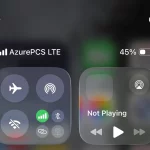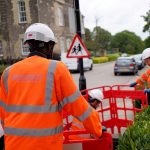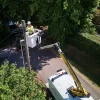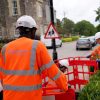TalkTalk and Vodafone in Legal Action Over BT’s Ethernet Controls
A new report reveals that Ofcom’s recent decision to soften regulation of BT’s (Openreach) high speed fibre optic Ethernet / data lines in the Central London Area (CLA) has resulted in rival UK ISPs – TalkTalk and Vodafone – lodging an appeal against the decision with the Competition Appeal Tribunal (CAT).
The decision was made as part of the regulator’s Physical Infrastructure (PIR) and Business Connectivity Market Reviews (BCMR) in May 2019 (here), which among other things concluded that “BT does not have market power in the CI Access services market in the [CLA], where many operators have substantial network presence, and we expect unrestricted [Physical Infrastructure Access] is likely to further increase competition. Therefore, we are not imposing regulation in the supply of CI Access services in the CLA.”
However Vodafone UK’s General Counsel and External Affairs Director, Helen Lamprell, told The Register that Ofcom’s decision could ultimately result in increased costs, which might eventually be passed on to consumers (e.g. higher prices for 5G mobile and possibly also fixed broadband packages). According to Helen, the wider estimated cost to businesses is said to be around £230m over the next 20 months.
Advertisement
Ofcom PIR / BCMR Statement (May 2019)
Ofcom finds that BT does not have SMP in the CLA. Even though BT has a high share of new customer ends, Ofcom concludes that BT’s market power will be sufficiently constraint by the very extensive presence of rival infrastructures in the CLA.
Customers in the CLA have on average 4.3 rival networks within 50m, and 90% of customers in the CLA have at least two rivals to BT within 50m, including 64% who have four or more rivals. In addition, given the high number of networks already present and the high business density, Ofcom expects at least some rivals to deploy infill network extensions using the unrestricted PIA remedy in the CLA.
Despite this Vodafone is understood to still be quite dependent, at least in some areas within the enterprise market, upon the high capacity data connectivity services provided by BT (Openreach). Likewise companies still using BT’s services (there are a lot of them) are often reluctant to change to a different supplier because of the complex disruption involved. There is a “massive disincentive for businesses to switch,” said the mobile giant.
According to the report, Vodafone has thus lodged an appeal against Ofcom’s CLA ruling, including its decision not to set the charge control as a cost-based price cap and not to impose a price cap in areas identified as “high network reach“.
An Ofcom spokesman said:
“Our rules have been designed to boost investment in high-speed data links, which is vital to the UK being a world leader in fibre and 5G technology. This litigation threatens to hold back that progress, so we’re extremely disappointed some companies have chosen to put commercial interest ahead of the national interest.”
At this point it’s worth noting that Ofcom’s last business connectivity review in 2016 was undone by incorrect market definitions (here), albeit for a different reason, and it would be very disruptive if that also ended up causing similar problems for their latest review.
Crucially such legal challenges are known to be long-winded affairs, which means that we might be waiting up to a year before the CAT comes back with a final decision and even that may not be the final challenge. All of this creates a complication for the current market review and raises the potential for delay.
Advertisement
Vodafone separately mentioned as part of Ofcom’s spring 2019 review that “London faces the highest network construction costs in the UK” and, hence, “if anything it is more challenging than the rest of the UK“.
Mark is a professional technology writer, IT consultant and computer engineer from Dorset (England), he also founded ISPreview in 1999 and enjoys analysing the latest telecoms and broadband developments. Find me on X (Twitter), Mastodon, Facebook, BlueSky, Threads.net and Linkedin.
« ISP Internet Central Builds Gigabit Full Fibre to Stafford Businesses

















































Comments are closed